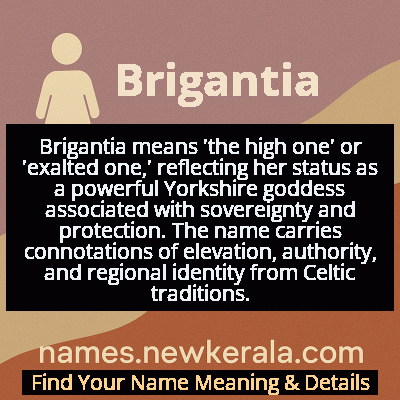Brigantia Name Meaning & Details
Origin, Popularity, Numerology Analysis & Name Meaning of Brigantia
Discover the origin, meaning, and cultural significance of the name BRIGANTIA. Delve into its historical roots and explore the lasting impact it has had on communities and traditions.
Name
Brigantia
Gender
Female
Origin
Anglo
Lucky Number
9
Meaning of the Name - Brigantia
Brigantia means 'the high one' or 'exalted one,' reflecting her status as a powerful Yorkshire goddess associated with sovereignty and protection. The name carries connotations of elevation, authority, and regional identity from Celtic traditions.
Brigantia - Complete Numerology Analysis
Your Numerology Number
Based on Pythagorean Numerology System
Ruling Planet
Mars
Positive Nature
Generous, passionate, energetic, and humanitarian.
Negative Traits
Impulsive, impatient, moody, and can be overly emotional.
Lucky Colours
Red, maroon, scarlet.
Lucky Days
Tuesday.
Lucky Stones
Red coral, garnet.
Harmony Numbers
1, 2, 3, 6.
Best Suited Professions
Military, sports, philanthropy, leadership roles.
What People Like About You
Courage, energy, leadership, generosity.
Famous People Named Brigantia
Brigantia of the Brigantes
Celtic tribal deity
Primary goddess worshipped by the Brigantes tribe in northern England, later syncretized with Roman Minerva
Brigantia Eboracensis
Mythological figure
Local embodiment of the goddess in York (Eboracum), featured in regional cult worship
Saint Brigantia
Early Christian saint
Local Yorkshire saint who carried forward elements of the pagan goddess in Christian tradition
Name Variations & International Equivalents
Click on blue names to explore their detailed meanings. Gray names with will be available soon.
Cultural & Historical Significance
Her significance extends beyond mere mythology to represent the cultural identity of northern England. The Brigantes tribe controlled territory from the Humber to the Tyne, with their capital at Isurium Brigantum (modern Aldborough). Brigantia embodied the land itself, serving as a divine protector of the tribe's territory and sovereignty. This connection to place makes her one of the most geographically specific deities in British Celtic religion, with her worship centered in what is now Yorkshire and surrounding regions, where she continues to influence local folklore and regional identity.
Extended Personality Analysis
Those named Brigantia are typically perceived as strong, protective, and authoritative figures with natural leadership qualities. They embody the characteristics of their namesake goddess—being territorial in a positive sense, fiercely loyal to their community, and possessing a deep connection to their roots and heritage. These individuals often display a commanding presence combined with nurturing instincts, making them natural guardians who balance strength with compassion.
Brigantia-named individuals tend to be ambitious and high-achieving, living up to the 'exalted' meaning of their name. They often exhibit strategic thinking and practical wisdom, much like the goddess's association with both warfare and craftsmanship. There's a notable independence and self-reliance to their character, coupled with a strong sense of justice and fairness. They typically value tradition while being adaptable to changing circumstances, reflecting the historical syncretism of the original goddess who incorporated Roman influences while maintaining Celtic identity.
Modern Usage & Popularity
In contemporary times, Brigantia remains a rare but meaningful choice, primarily used by families with Yorkshire heritage or those interested in Celtic mythology and history. The name has seen a modest resurgence in recent years as part of the broader trend toward mythological and historical names, though it remains outside the top 1000 names in most English-speaking countries. It's particularly popular among academic families, historical reenactors, and those seeking strong feminine names with deep regional connections. Modern usage often shortens to 'Brig' or 'Bria' for everyday convenience while preserving the full name's historical gravitas. The name maintains a niche but dedicated following, especially in Yorkshire and among Celtic revival communities.
Symbolic & Spiritual Meanings
Brigantia symbolizes sovereignty, protection, and regional identity. Her name represents the concept of 'highness' or 'exaltation,' making her emblematic of elevated status, authority, and spiritual aspiration. As a goddess who protected her people's territory, she symbolizes boundaries, defense, and the sacred connection between a people and their land. The syncretism with Roman Minerva adds layers of meaning related to wisdom, strategy, and craftsmanship, while her warrior aspects symbolize strength and resilience. Brigantia embodies the transition from independence to integration while maintaining cultural identity, making her a powerful symbol of adaptation and preservation in the face of cultural change.

